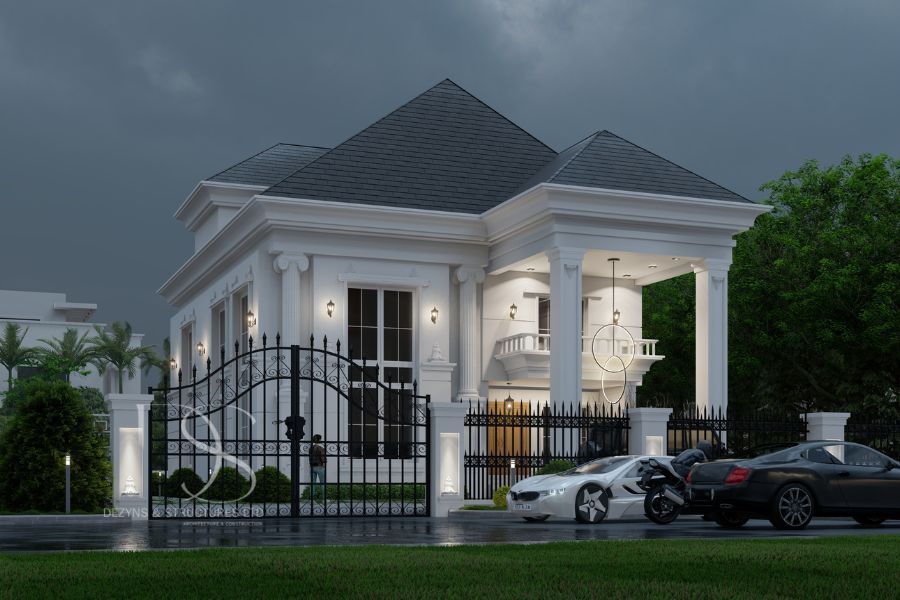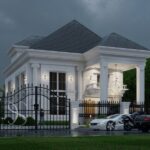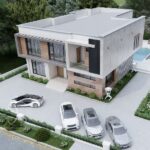Table of Contents
In today’s Nigeria, asking “How much will it cost in building a house in Nigeria?” is almost like asking, “How long is a rope?” the answer depends on so many factors that can change overnight. With cement prices on the rise, exchange rates fluctuating wildly, and even artisans charging differently by the week, building your dream home is no longer just about bricks and mortar — it’s a strategic financial journey.
Whether you’re considering a modest 2-bedroom bungalow or a luxury 5-bedroom duplex, understanding what determines the cost of construction in Nigeria today can save you millions and help you plan wisely.
Factors That Determine Construction Cost in Nigeria Today
- Type of Building: Bungalow (simpler and lower cost, suitable for retirees or nuclear families)
Duplex (medium to high cost; requires deeper foundation and more finishes)
Multi-storey Apartment or Commercial Building (complex engineering, higher materials/labor)
Luxury Projects (pool, gym, smart tech, etc., increase cost exponentially).
- Material Prices: This is arguably the biggest factor. Nigeria relies heavily on imported construction materials and inflation affects even locally sourced ones like sand or granite.
Cement (₦6,500 – ₦8,000/bag)
Reinforcement rods (Iron) – priced based on weight and fluctuates with the dollar. Tiles, electrical fittings, roofing materials – many are imported and dollar-dependent
POP, paints, and finishing materials – quality and brand can double your cost
Pro Tip: Buy in bulk where possible and lock in prices before inflation hits again.
- Labor Costs: Your location and the experience level of your artisans matter. A skilled tiler in a major city will likely charge more than one in a smaller town.
Labor is usually calculated per square meter or job done.
Masons, carpenters, electricians, plumbers, tilers, painters – each adds to cost
Site supervisors or project managers – optional but valuable for oversight. A well-managed team Your location and the experience level of your artisans matter. A skilled tiler in a major city will likely charge more than one in a smaller town.
Labor is usually calculated per square meter or job done.
Masons, carpenters, electricians, plumbers, tilers, painters – each adds to cost
Site supervisors or project managers – optional but valuable for oversight.
A well-managed team reduces waste and delays, ultimately cutting costs.
- Location of the Project: The state, terrain, and urban density all contribute:
Urban Areas: Higher land, permit, and labor costs.
Remote Area: May incur transport surcharges.
Swampy or Waterlogged Areas: Require sand filling, piling, or raft foundation. Location determines not just the cost—but also the speed of construction.
- Foundation Type and Site Conditions: Before you go up, you go down — and that “down” can be expensive.
Shallow foundation: Cheaper, ideal for bungalows
Piling or raft foundation: Costly, necessary for weak soil or multi-storey structures. Soil testing before starting can save you millions in structural corrections later.
- Design Complexity: A simple square building is cheaper than a building with curves, cantilevers, balconies, and split levels. Architectural design, Structural engineering design, MEP detailing, Smart home integrations. Custom designs may be beautiful but always come at a price.
- Finishing Level: This is where budgets can spiral out of control:
Standard Finishing: POP ceiling, regular tiles, basic fittings reduces cost
High-End Finishing: Marble floors, designer bathrooms, smart lighting can exponentially increase cost. The difference between a ₦100 and a ₦70M duplex is usually in the finishing.
- Regulatory Fees & Documentation: You can’t build legally without these:
Building permits, Architectural and structural approvals, Environmental impact assessments (EIA), C of O or Governor’s Consent. These can cost between ₦500K to several million depending on location.
- Utility Infrastructure: Many Nigerian developers must provide:
Borehole water system, Septic tank or treatment plant, Alternative power source (solar/inverter or generator). Off-grid utility planning adds to upfront cost but saves money long-term.
- Economic Factors: Exchange rate: Directly affects cost of imported fittings and materials
Inflation: Impacts prices weekly/monthly
Government policies: Import bans, VAT on building materials, subsidy removal. Always build with room for 10–15% cost fluctuation.
Final Thoughts: Plan Smart, Not Just Big
Building in Nigeria today is not impossible, but it requires planning, budgeting, and a good support team (architects, builders, project managers, and quantity surveyors). The dream is valid — but only if backed by smart choices.
If you’re ready to build or renovate, get professional guidance to develop a realistic bill of quantities (BOQ) based on your preferred design, location, and spec.
Need Help?
We help clients across Nigeria bring their building dreams to life—from design to supervision.
📩 Send us a message today to get started with a free consultation.




